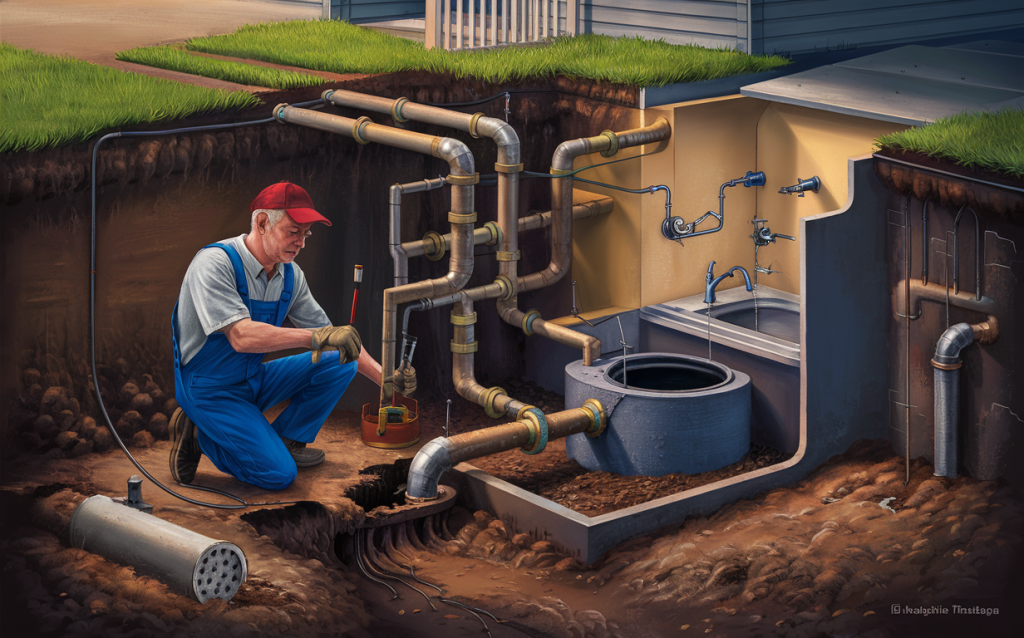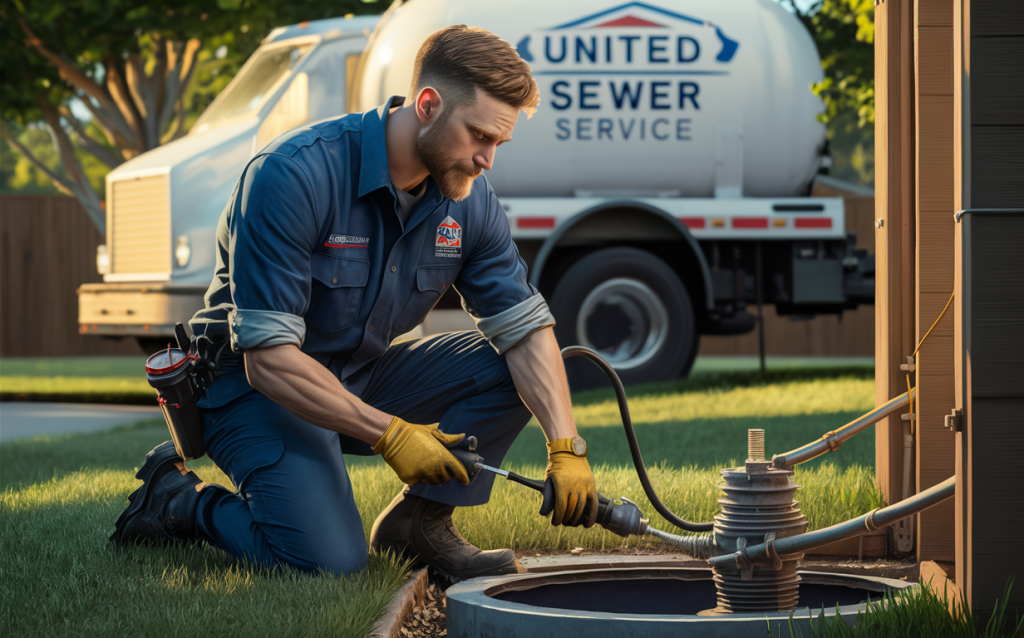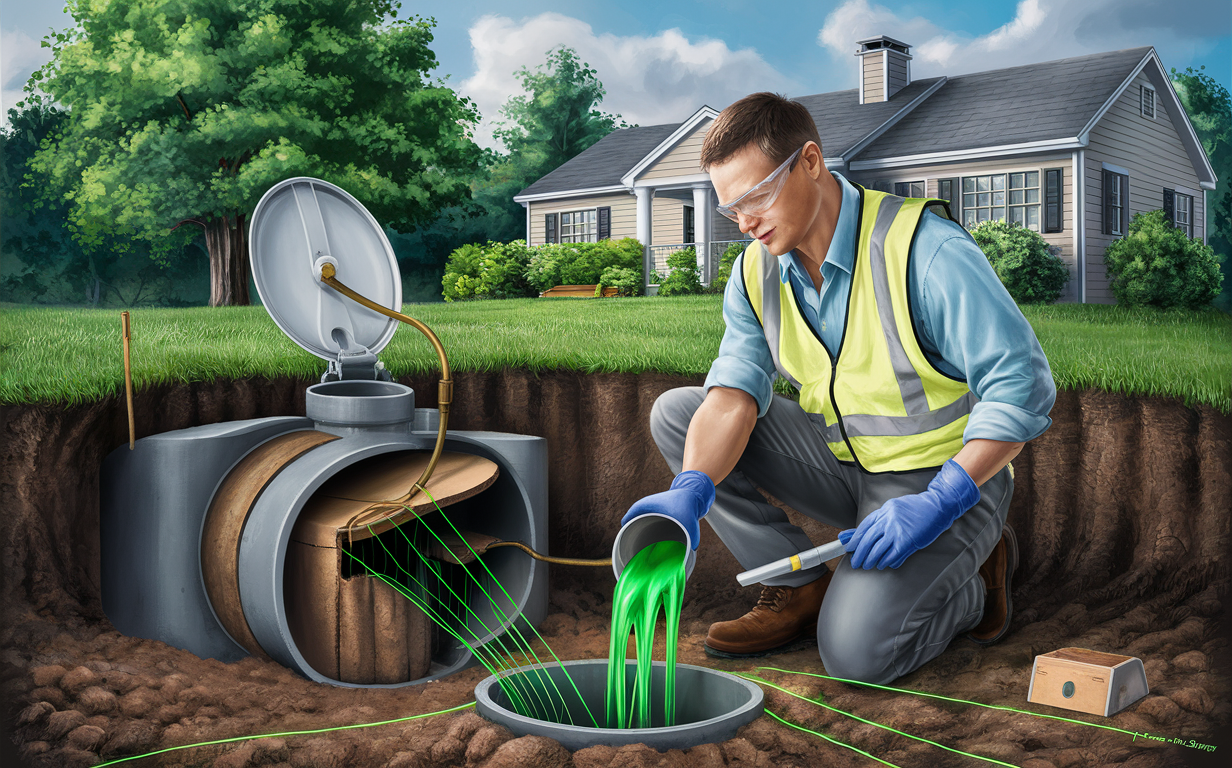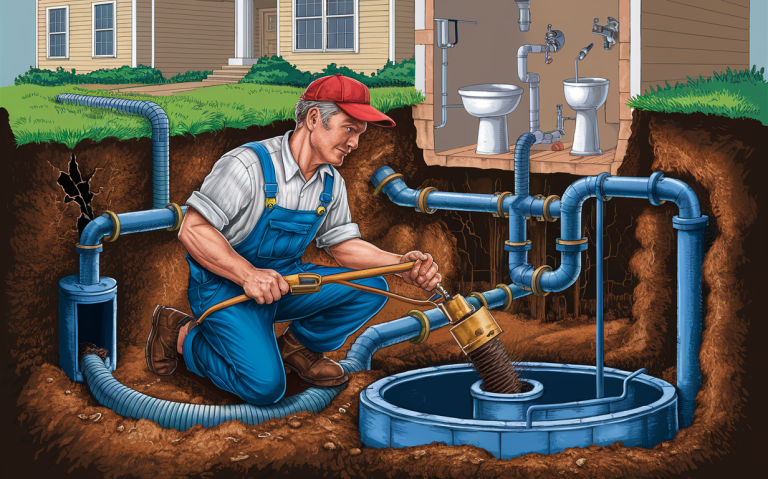Removing Sludge and Scum Buildup During Septic Tank Pumping
Learn effective techniques for removing sludge and scum buildup during septic tank pumping. Maintain your wastewater system for longevity
Septic tank pumping is a crucial maintenance task that involves removing sludge and scum buildup to keep your system functioning properly. This process is essential for homeowners in Middletown, New York, and the surrounding areas who rely on septic systems for wastewater management removing sludge and scum buildup during septic tank pumping.

Table of Contents
Key Takeaways
- Regular septic tank pumping prevents system failures and costly repairs
- Sludge and scum are the main components removed during pumping
- Professional pumping services use specialized equipment for thorough cleaning
- The frequency of pumping depends on tank size, household size, and water usage
- Proper maintenance between pumpings can reduce buildup and extend the time between services
- Signs of a full tank include slow drains, bad odors, and wet spots in the yard
- Middletown residents should consider local regulations and environmental factors
Understanding Removing Sludge and Scum Buildup During Septic Tank Pumping
Sludge and scum are two distinct layers that form in your septic tank over time. Sludge settles at the bottom of the tank and consists of solid waste that has broken down. Scum, on the other hand, floats on top of the liquid layer and is made up of oils, greases, and other lightweight materials.
As these layers build up, they reduce the tank’s capacity to hold and treat wastewater effectively. This is why regular pumping is so important for maintaining a healthy septic system.

The composition of sludge
Sludge is primarily composed of:
- Organic matter from human waste
- Food particles
- Toilet paper residue
- Bacteria and other microorganisms
Over time, this layer compacts and becomes denser, making it harder to remove if left for too long.
The makeup of scum
Scum typically contains:
- Cooking oils and grease
- Soap residues
- Hair and other floating debris
This layer can form a barrier that prevents proper venting and can lead to odor problems if not addressed.
The Importance of Regular Septic Tank Pumping
Regular pumping is not just a recommendation; it’s a necessity for the longevity and efficiency of your septic system. For Middletown homeowners, it’s particularly important due to the area’s climate and soil conditions.
Pumping removes the accumulated sludge and scum, restoring the tank’s capacity to process wastewater effectively. This prevents backups, system failures, and potential contamination of groundwater.
How often should Middletown residents pump their tanks?
The frequency of pumping depends on several factors:
- Tank size
- Number of people in the household
- Water usage habits
- The presence of a garbage disposal
As a general rule, most homes in the Middletown area should have their tanks pumped every 3-5 years. However, larger families or those with high water usage may need more frequent service.
The Septic Tank Pumping Process
Understanding the pumping process can help homeowners appreciate the importance of this maintenance task and what to expect when the professionals arrive.
Locating and accessing the tank
The first step is locating the septic tank. In Middletown, many homes have detailed records of their septic system layout. If not, professionals use special equipment to find the tank without excessive digging.
Inspection before pumping
Before pumping begins, the technician will inspect the tank’s condition, checking for cracks, leaks, or other issues that might need attention.
The pumping procedure
The actual pumping involves:
- Inserting a large hose into the tank
- Using powerful vacuum equipment to remove the contents
- Breaking up stubborn sludge deposits with water jets or mechanical agitators
- Removing as much solid material as possible
Post-pumping inspection
After pumping, the technician will perform a final inspection to ensure the tank is clean and in good condition.
Advanced Techniques for Thorough Cleaning
Modern septic pumping services often employ advanced techniques to ensure a thorough cleaning. These methods are particularly useful for tanks that haven’t been pumped in a long time or have excessive buildup.

Hydro-jetting for stubborn deposits
Hydro-jetting uses high-pressure water to break up and remove tough sludge deposits. This technique is especially effective in older tanks or those with heavy buildup.
Mechanical agitation
Some pumping trucks are equipped with mechanical agitators that can break up solid deposits, making them easier to remove.
Vacuum truck technology
The latest vacuum trucks used by Middletown septic services can create powerful suction, capable of removing even the most stubborn waste materials.
Preventing excessive buildup between pumpings
While regular pumping is essential, there are steps Middletown homeowners can take to reduce buildup and extend the time between services.
Water conservation strategies
Reducing water usage can slow the accumulation of sludge and scum. Simple steps like fixing leaks and using water-efficient appliances can make a big difference.
Proper waste disposal habits
Avoid flushing non-biodegradable items or pouring grease down the drain. These can contribute to excessive scum buildup and clog your system.
Use of septic-safe products
Choose cleaning products that are labeled as septic-safe. Harsh chemicals can disrupt the bacterial balance in your tank, leading to faster buildup.
Signs your Septic Tank Needs Pumping
Removing sludge and scum buildup during septic tank pumping and recognizing the signs of a full septic tank can help Middletown residents avoid system failures and costly repairs.
Slow drains and gurgling sounds
If your drains are slow or you hear gurgling noises, it could indicate that your tank is nearing capacity.
Foul odors around the property
Bad smells near your drains or in your yard are often a sign that your septic system is overdue for pumping.
Wet spots in the yard
Soggy areas near your septic tank or leach field can indicate that the system is overloaded and needs attention.
The Role of Bacteria in Septic Systems
Beneficial bacteria play a crucial role in breaking down waste in your septic tank. Understanding this process can help you maintain a healthy system.
Natural bacterial action
The bacteria in your tank naturally digest organic matter, converting it into liquids and gases. This process is essential for proper waste treatment.
Maintaining a healthy bacterial population
To keep your bacterial population thriving:
- Avoid using antibacterial soaps and cleaners excessively
- Don’t flush medications or chemicals that could harm bacteria
- Consider using septic-specific bacterial additives if recommended by a professional
Environmental Considerations for Middletown Septic Owners
Proper septic maintenance is not just about keeping your system running; it’s also about protecting the local environment.

Protecting local water sources
Middletown’s proximity to the Wallkill River and other water bodies makes proper septic maintenance crucial for preventing water pollution.
Soil health and septic systems
The soil around your septic system plays a vital role in treating wastewater. Regular pumping helps maintain soil health and prevents contamination.
The Cost of Septic Pumping
Understanding the costs associated with septic pumping can help homeowners budget for this essential service.
Factors affecting pumping costs
Several factors can influence the cost of septic pumping in Middletown:
- Tank size
- Accessibility of the tank
- Frequency of pumping
- Additional services required (e.g., repairs or inspections)
Average costs in the area
While prices can vary, most Middletown homeowners can expect to pay between $300 and $500 for a standard septic tank pumping service.
Long-term cost savings
Regular pumping, while an upfront expense, can save money in the long run by preventing costly system failures and repairs.
Choosing a Septic Pumping Service in Middletown
Selecting the right septic service provider is crucial for ensuring your system is properly maintained.
Qualifications to look for
When choosing a septic pumping service in Middletown, consider:
- Proper licensing and insurance
- Experience with local septic systems
- Positive reviews from other Middletown residents
- Use of modern equipment and techniques
Questions to ask potential providers
Before hiring a service, ask:
- What is included in their pumping service?
- Do they provide a thorough inspection?
- How do they dispose of the waste?
- What are their emergency service policies?
Septic System Maintenance Beyond Pumping
While pumping is a critical part of septic maintenance, there are other steps Middletown homeowners should take to keep their systems healthy.
Regular inspections
Annual inspections can catch potential issues before they become major problems.
Leach field care
Proper care of your leach field, including avoiding heavy traffic and planting appropriate vegetation, is essential for system longevity.
Record keeping
Maintain detailed records of pumping services, repairs, and inspections. This information can be valuable for future maintenance and if you ever sell your home.
The Impact of Household Habits on Septic Health
Your daily habits can significantly affect the health of your septic system and the frequency of required pumpings.
Water usage patterns
Spreading out water usage throughout the day, rather than doing all laundry at once, for example, can help your system process waste more effectively.
Garbage disposal use
While convenient, excessive use of garbage disposals can increase the rate of sludge buildup in your tank.
Proper toilet habits
Only flush human waste and toilet paper. Other items, even those labeled “flushable,” can cause problems in your septic system.
Seasonal Considerations for Septic Maintenance
Removing sludge and scum buildup during septic tank pumping in Middletown’s changing seasons can affect your septic system in various ways.
Winter precautions
Cold winters can cause freezing issues. Proper insulation and avoiding snow compaction over your system can help prevent problems.
Spring thaw concerns
The spring thaw can lead to saturated soil, potentially affecting your leach field’s performance. Be extra vigilant during this time.
Summer maintenance tips
Summer is often the best time for pumping and inspections in Middletown. Take advantage of the good weather to schedule these services.
Innovations in Septic System Technology
New technologies are making septic systems more efficient and easier to maintain.
Advanced treatment systems
Some newer systems use additional treatment processes to reduce the frequency of pumping needed.
Smart monitoring systems
Technologies that allow remote monitoring of septic systems are becoming more common, helping homeowners catch issues early.
Local Regulations and Septic System Management
Removing sludge and scum buildup during septic tank pumping Middletown and the surrounding areas have specific regulations regarding septic system maintenance and pumping.
Understanding local codes
Familiarize yourself with local regulations regarding septic system maintenance and pumping frequency.
Permits and inspections
Some maintenance activities may require permits or official inspections. Stay informed about these requirements to avoid potential fines.
The Role of Professional Septic Services
While some maintenance tasks can be done by homeowners, professional services play a crucial role in keeping septic systems healthy.
When to call a professional
Always call a professional for:
- Pumping services
- System inspections
- Repairs or replacements
- Unusual odors or backup issues
Building a relationship with a septic service provider
Establishing a long-term relationship with a reputable septic service in Middletown can ensure consistent, quality care for your system.
Educating the Household on Septic Care
Ensuring everyone in your household understands how to care for the septic system is crucial for its longevity.
Creating a septic-friendly home environment
Educate family members about proper waste disposal and water usage habits that support septic health.
Teaching children about septic systems
Even young children can learn basic concepts about septic care, like what should and shouldn’t be flushed.
Emergencies and Septic Systems
Knowing how to handle septic emergencies is crucial for Middletown homeowners.
Signs of septic failure
Be alert for signs of major issues, such as sewage backups or unusually wet areas in your yard.
Emergency pumping services
Have the contact information for a 24/7 septic service readily available in case of emergencies.
The Importance of Proactive Septic Care
Removing sludge and scum buildup during septic tank pumping maintenance is key to a healthy septic system. By understanding the process of removing sludge and scum during pumping and following good maintenance practices, Middletown homeowners can ensure their septic systems function efficiently for years to come. Remember, a well-maintained septic system not only protects your property but also contributes to the overall environmental health of the Middletown community.
Learn effective techniques for removing sludge and scum buildup during septic tank pumping. Maintain your wastewater system for longevity. For more information, you can visit our website or contact us.






